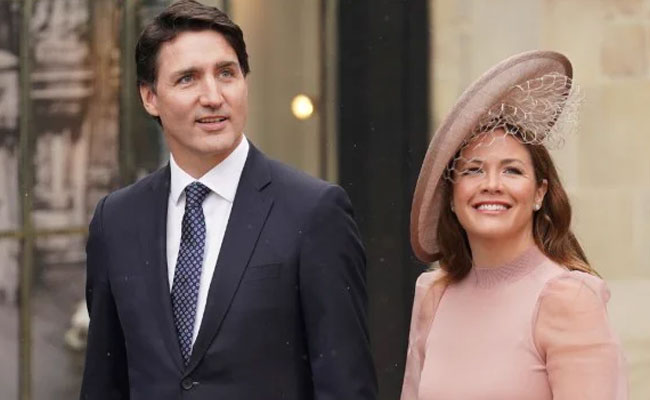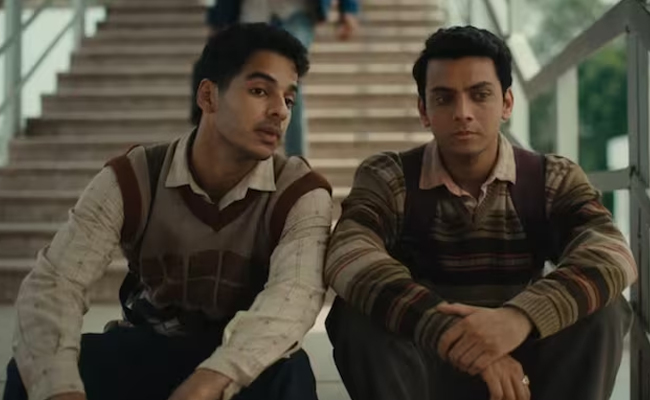Toronto (AP): Canadian Prime Minister Justin Trudeau and his wife, Sophie Gregoire Trudeau, announced on Wednesday that they are separating after 18 years of marriage.
The two said in statements posted on Instagram that they made the decision after "many meaningful and difficult conversations". A statement from the prime minister's office said they both have signed a legal separation agreement.
Trudeau, the 51-year-old scion of one of Canada's most famous politicians, was sworn into office in 2015. Sophie Trudeau is a former model and TV host. The couple were married in 2005. Together, they brought star power to the prime minister's office and appeared in the pages of Vogue magazine.
They have three children, 15-year-old Xavier, 14-year-old Ella-Grace and nine-year-old Hadrien.
"As always, we remain a close family with deep love and respect for each other and for everything we have built and will continue to build," the two said on Instagram.
An official familiar with the matter said Trudeau will continue to live at Rideau Cottage in Ottawa, where he has lived since 2015, and the children will primarily live there to maintain stability.
The official said she has moved to a separate Ottawa home, but will spend time at Rideau Cottage at times, including when he is travelling. The official spoke on the condition of anonymity because they were not authorised to speak publicly.
She has played a less visible role in recent years, rarely travelling with the prime minister on official trips. The two were seen together publicly at Canada Day events in Ottawa last month.
"They remain a close family, and Sophie and the prime minister are focussed on raising their kids in a safe, loving and collaborative environment," the statement from Trudeau's office said. "The family will be together on vacation, beginning next week."
His office requested respect for their privacy.
Justin Trudeau and Sophie Gregoire met as children when she was a classmate of his youngest brother, Michel, and they reconnected as adults when they co-hosted a 2003 charity gala.
Trudeau is the second prime minister to announce a separation while in office.
His father, Pierre Trudeau, and mother, Margaret Trudeau, separated in 1979 and divorced in 1984 during the elder Trudeau's final year in the prime minister's office.
Margaret Trudeau wrote in her memoir that she had a romance with Senator Ted Kennedy. During a 1977 visit to Washington, DC with Pierre, she sat listening to her husband's speech before Congress while feeling "torn between an intense need for him and a longing for Ted Kennedy". Margaret wrote she became infatuated with Kennedy after meeting him a few years earlier. She told Kennedy that he "had not destroyed my marriage but that I had used him to help me destroy a marriage that was already over".
Just weeks later, Margaret, who had then-undiagnosed mental illness, left her husband to party with the Rolling Stones in Toronto. The marriage ended soon after that.
Justin, who was a child when his parents separated, wrote in his 2014 book "Common Ground" that public life took its toll. "I knew, even then, that the demands imposed by the life my parents were leading affected them far more than the ordinary stress of parenthood," he wrote.
Justin Trudeau channelled the star power of his Liberal icon father when he first won office in 2015. Scandals, voter fatigue and economic inflation have taken a toll on his popularity after eight years in power.
Just a few months ago, Trudeau posted a picture of himself holding hands with his wife on their anniversary and wrote, "Every mile of this journey together is an adventure. I love you, Soph. Happy anniversary!"
Nelson Wiseman, a political science professor at the University of Toronto, had thought that Trudeau would seriously consider stepping down sometime next year or early in 2025.
"The separation may have been partially driven by an ultimatum from Sophie that Trudeau not contest the next election," Wiseman said. "I now think he is more likely to stick in the political arena."
Let the Truth be known. If you read VB and like VB, please be a VB Supporter and Help us deliver the Truth to one and all.
Mumbai (PTI): Neeraj Ghaywan's much acclaimed "Homebound" is among the 15 films shortlisted in the best international feature category at the Oscars, moving a step close to the final five nominations and maybe a win.
The movie, inspired by a true story that became the basis of a news article during the pandemic, has been creating a global buzz since its debut in the Un Certain Regard category at the Cannes Film Festival this May.
Hollywood legend Martin Scorsese is a fan and has come onboard as an executive producer ahead of the award season.
Produced by Karan Johar and Adar Poonawalla, and starring Ishaan Khatter, Vishal Jethwa and Janhvi Kapoor, "Homebound" is Ghaywan's second movie after "Masaan".
"Homebound" will compete for an Oscar nomination alongside Argentina's “Belén”, Brazil's “The Secret Agent”, French drama "It Was Just an Accident”, Germany's "Sound of Falling” and Iraq's "The President's Cake".
ALSO READ: Actress Shilpa Shetty's restaurant booked for breaching operating hours
The other movies in the shortlist include Japan's “Kokuho”, Jordan's “All That’s Left of You”, Norway's “Sentimental Value”, Palestine's “Palestine 36”, South Korean hit “No Other Choice”, Spain's “Sirat”, "Late Shift" from Switzerland, “Left-Handed Girl”from Taiwan and Tunisian drama “The Voice of Hind Rajab”, the Academy of Motion Picture Arts and Sciences announced in a release on Tuesday.
The award for best foreign film, now re-categorised as best international feature, has so far eluded India.
Only three Indian films have received nominations in the category -- Mehmood Khan’s “Mother India”, Mira Nair’s “Salaam Bombay” and Ashutosh Gowarikar’s “Lagaan”. Deepa Mehta’s “Water”, starring John Abraham and Lisa Ray, also received a nomination but it was submitted from Canada.
Gujarati film "Chhello Show" in 2023 was the last film to get shortlisted.
Costume designer Bhanu Athaiya was the first Indian to get an Oscar, bagging the coveted prize in 1983 for the film "Gandhi". Other than her, A R Rahman, Resul Pukootty and M M Keeravani have also won individual Oscars.
Team "Homebound" celebrated the shortlist news with posts on social media.
"We made the shortlist... Way to go team Homebound'!" Johar shared in Instagram Stories.
In a post, the producer said it was difficult for him to articulate how "proud and elated" he was with the news.
"All of us @dharmamovies are privileged to have this proud and important film in our filmography... thank you @neeraj.ghaywan for making so many dreams of ours come true... from Cannes to being on the Oscar shortlist this has been such an overwhelming journey! Love to the entire cast and crew and teams of this special special film! Upwards and onwards...."
Ghaywan also shared the news on X.
"#Homebound has been shortlisted for Best International Feature Film at the 98th Academy Awards! We are deeply grateful for the extraordinary love and support we've received from around the world," he wrote on X with a special poster of the film.
Jethwa, who plays one of the two friends in the story opposite Ishaan Khatter, said the moment feels "surreal and incredibly humbling".
"To see 'Homebound' being shortlisted and progressing towards the Oscars is something I could have only dreamed of. I am deeply grateful for the love and support the film has received from audiences around the world," he said as he acknowledged Johar, Ghaywan and co-star Khatter and the rest of the team.
Khatter also shared the news on his Instagram stories and wrote, "Oscar ab dur nahi".
ALSO READ: MGNREGA rename: Gandhi made ‘Raghupati Raghav Raja Ram’ national anthem, Kangana sparks row
"Homebound" is inspired by journalist Basharat Peer's The New York Times article “Taking Amrit Home”, also titled "A Friendship, a Pandemic and a Death Beside the Highway".
The film portrays the childhood friendship between a Muslim and Dalit who chase a police job that promises them the dignity they have long been denied due to their surnames.
The Academy on Tuesday also announced shortlists in 11 other categories, including the newly added casting Oscars, animated shorts, cinematography, documentary feature, documentary short, original score and song, sound and visual effects categories.
Nominations for the 98th Academy Awards will be announced on Thursday, January 22, 2026.
Twenty-four categories will be awarded at the 98th Oscars. Each category has five nominees, except for best picture, which has 10.
The 98th Oscars will be held on Sunday, March 15, 2026, at the Dolby Theatre in Los Angeles.





